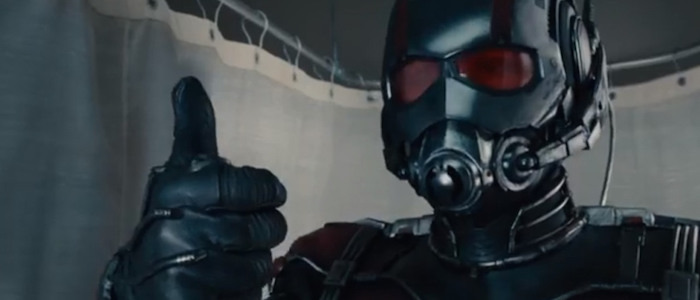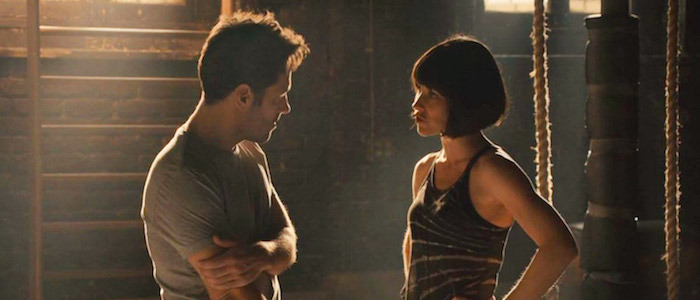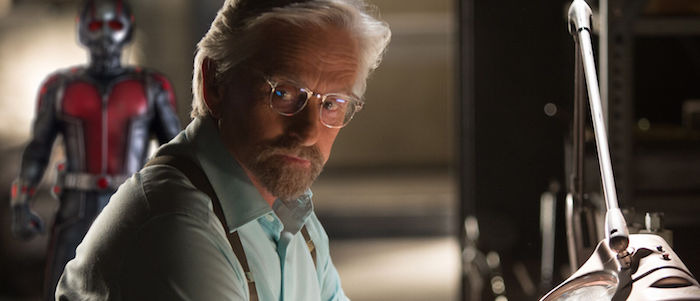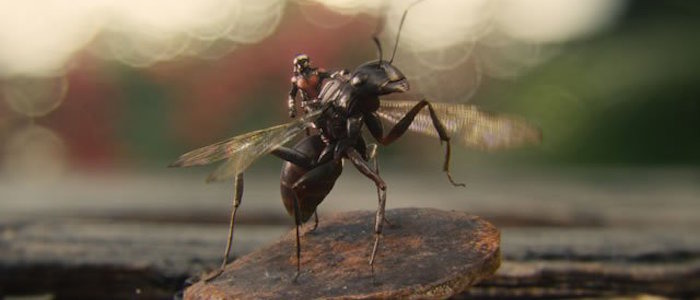Road To Endgame: 'Ant-Man' Is Simple And Sincere, But It Feels Like Something Is Holding It Back
(Welcome to Road to Endgame, where we revisit the first 22 movies of the Marvel Cinematic Universe and ask, "How did we get here?" In this edition: Ant-Man is charming, but feels like two different scripts smashed together)Ant-Man would've been a different beast under director Edgar Wright (Hot Fuzz, Shaun of the Dead), who left the project over creative differences in 2014. The Avengers had recently swept the globe, and with the note-factory that was Marvel Creative Committee still intact under Marvel chairman Ike Perlmutter, directorial freedom wasn't exactly on the table. (The Committee was finally disbanded in 2015).Marvel Studios then was a far cry from Marvel Studios today, just a few years removed. While it's nice to imagine what could have been, Peyton Reed of Yes Man and Bring It On did an ample job; for better or worse, the film the studio wanted seems more fitting for Reed's wheelhouse than Wright's. Several visual flourishes people presume were Wright's were actually Reed's doing — Luis' hilarious callbacks, for one — though the story feels like the product of conflicting rewrites.While Ant-Man's personal scale feels like a palette cleanser from Marvel's end-of-the-world bombast, one might ponder whether going smaller and more personal is inherently more sound, especially when major decisions still feel like they've had their edges sanded down. Wright was rumoured to have written a more morally grey film, about a hardened criminal being reformed. The end result is anything but, yet it curiously (and paradoxically) echoes elements of Wright's original drafts — as if the finished product were unable to escape its past.Like the protagonist at its center, it's tough for Ant-Man to be truly good when forces beyond its control keep holding it back.
Scott Lang, Ant-Man 2.0
Paul Rudd brings a boyish charm to any role he plays. His "Aw, shucks!" demeanor is perfect for the film's version of Scott Lang, though this iteration of the character is also trapped in a story that can't decide what it wants him to be.Lang hopes to be worthy of the heroism his daughter Cassie (Abby Ryder Fortson) sees in him. It's a touching sentiment, one he's reminded of by both his ex-wife Maggie (Judy Greer) and his mentor Hank Pym (Michael Douglas), the original Ant-Man, but Lang's journey feels disconnected from the plot surrounding it. He's an expert burglar, with a detailed understanding of the ins and outs of security. This is why Pym recruits him for a heist, as he likely did in Wright's version, but these logistics are at odds with how the final film paints Lang's morality.Lang has exceptional thieving skills, but the film makes sure to note that he only stole the one time. Not only that, he stole from a company that wrongly fired him, and he even returned large sums of money to the people they swindled. Several characters laud Lang for this one-off Robin Hood-ism, but others in the film treat him like a repeat offender when he gets out of prison. Lang's ex-wife talks to him like stealing is a continued habit, one he can't shake long enough to re-enter his daughter's life, and one he's supposedly fallen back on multiple times. It isn't.The film feels stitched together from entirely different drafts: Wright's, about a hardened criminal, and the lighter version the studio wanted instead, in which Lang made an error of judgement. The result is two conflicting Scott Langs, depending on who you ask. The film's central problem however, isn't limited to contradictory details. The problem is how those details inform and frame Lang's story.
Lang vs Lang
It's hard for a convicted felon to find honest work, a continued punishment for what is explicitly a one-time act of recklessness. Lang's sincere attempts to keep his job make him instantly sympathetic. However, when Lang shows up to his daughter's birthday party, he talks about having "gone straight," as if his past involves a criminal lifestyle, rather than a single act of misguided vigilantism.The problem therein becomes not only about who Scott Lang is (and what kind of life he's lived), but what he even needs to change about himself in order to be worthy of his daughter. Is Lang a good person who made a single mistake, trying claw his way back despite a system that doesn't believe in change? Or is he a repeated criminal who needs to leave his old life behind, and radically change his behaviour? The film seems to want it both ways, and satisfyingly expresses neither.Pym's heist involves Lang learning new skills. But Lang arriving at this point is purely a matter of honing Pym's technology, rather than Lang having his morality challenged in any way. Lang is already someone willing to risk everything for his daughter; nothing about his story involves attaining a new sense of worth or heroic stature, or doing anything he wouldn't have done at the beginning of the film.The apparent need for change is paid constant lip-service, by everyone from Pym, to Maggie, to Maggie's husband Paxton (Bobby Cannavale). And yet, like the contradictory character at its center, Ant-Man manages to get by on sweetness alone.
Family and Legacy
Ant-Man is about fathers trying to be better in their daughters' eyes. On paper, it's a far more potent theme than most other Marvel films, even if this theme eventually falls by the wayside, and the fatherly disappointments aren't all that disappointing. However, the idea has enough momentum (and is different enough from most superhero movies) to see the story through.The film's villain Darren Cross (Corey Stoll), a.k.a. the Yellowjacket, contends with his own form of disappointment. All he wants is to be worthy of his father figure, Hank Pym, but he's never quite understood the pain that led Pym to bury the Ant-Man project (the disappearance of Pym's wife Janet). Cross is selfish, and he refuses to acknowledge the frayed dynamic between Pym and his daughter, Hope Van Dyne (Evangeline Lilly). Cross is the film's villain, in part, because he doesn't care about family.Pym recruits Lang because he sees himself in him. Their mutual desire to be worthy of their daughters' love turns the idea of Ant-Man into more than just a superhero costume. This shared identity, passed down between fathers, becomes a means for each man to prove themselves not just good heroes, but good parents — at least in theory. As it turns out, Pym's story is just as disconnected as Lang's.Pym does little to make up for his aloofness during Hope's childhood, especially when she was mourning her mother, Janet Van Dyne. Their reconciliation is framed around the reveal of Janet's disappearance into the Quantum Realm, and Pym's subsequent search to find her. All Pym does is tell Hope the truth about her mother, and he's instantly forgiven. Despite his drive to be worthy of his daughter's love — something he pushes Lang toward as well — Pym never truly confronts his mistakes, nor does he make any decisions (let alone go through any changes) that align with his own idea of worth.Coasting on sentimentality amidst the illusion of change is emblematic of the film's problems. The revelation of Janet's disappearance could have arrived at any other point in the narrative, and little else would be different. Darren Cross is said to have been driven mad by his experiments, but there's no sense of who the pre-madness Cross was, how his behavior is different now, or what's being lost as he plunges further into villainy.Hope is arguably the only character with anything approaching a dramatic shift — resenting her father in one moment, forgiving him in the next — but she's sandwiched between the two Ant-Men, and is rendered secondary to their stories (her minor role in Wright's drafts was expanded by Reed). Lang helps Hope understand Pym's love and protectiveness, but it's ne'ery a challenge for Pym, and Hope herself does little in return but train Lang to fight.However, like Iron Man 3 before it, Ant-Man still manages to stick out from the Marvel pack, despite being one of its most muddled entries. This is owed, in part, to it being one of the very few Marvel films with noteworthy visual execution.
Execution
Director Peyton Reed makes Ant-Man consistently, thoroughly watchable, despite its fumbled thematic through-line. Much of Reed's success hinges on his ability to inject funny characters with a genuine sense of warmth. In addition, the film's unique visual perspective — its tilt-shifted effects, making the world seem humungous when the characters shrink — is simply delightful.Outside of the rote Pym-Hope exposition, Ant-Man is filled to the brim with camaraderie. Chatterbox Luis (Michael Peña) and his excitable crew feel like they've stepped right out of the funny pages, while young Cassie is the sort of mischievous imp who might read one of their stories. Every supporting character has a lovable quality — in part, because they act out of love in the first place.The thieves get along famously, but their thievery is never at the cost of their humanity; Luis even stops mid-mission to make sure they're still the "good guys." Cassie just wants her dad, Lang just wants to be with Cassie, and while Maggie and Paxton set strict terms for Lang's visitation, they aren't framed as his antagonists. Rather, they act out of a sense of duty to their daughter, and out of the genuine belief that Lang might be able change. When Lang proves himself a hero, he's welcomed back into their home.Fittingly, Reed knows how to time the little things. Whether someone makes a sudden move — a punch, a flinch, or even a look of disbelief — or the camera swings rapidly within tight spaces (a jail cell, or the confines of a circuit board when Lang has shrunk down), Reed uses his shots to flesh out the characters; standard operating procedure for cinema, but the kind of basic visual storytelling that often escapes Marvel's films. The lack of precise theme or narrative is almost made up for by the precision of the action. Almost.Except for an obligatory Avenger cameo (then again, is more Anthony Mackie really a problem?), the action in Ant-Man is limited either to thieving, or to training for said thieving. Every set-piece is imbued with a sense of excitement, even though there's no real ticking clock. Though, the presence of one would have certainly given the characters more urgent reasons to fight for their respective families.Of course, I'd be remiss if I didn't mention that Ant-Man is the first Marvel film rooted in a clear, explicit political perspective vis-à-vis the American military. It was unburdened, as far as we know, by its script needing to be approved by the U.S. Department of Defense, as was the case with Pentagon-subsidized (and thus, military-approved) entries like Iron Man, Iron Man 2, Captain America: The Winter Soldier and Captain Marvel.This political outlook is verbalized in Darren Cross' demonstration video for S.H.I.E.L.D./H.Y.D.R.A. and the U.S. military. The reel is a satirical look at the sanitized, often focus-tested language used to further the military industrial complex, with calls to freedom and noble battle laid over images of insect-sized soldiers carrying out horrendous war crimes and assassinations in America's name. In fact, this articulation of political perspective might be both the most precise element of the film, as well as the funniest, though it has little to do with the characters or their journeys (beyond positioning them as alternatives to Tony Stark).Ultimately, Ant-Man falls short of its goal of dramatizing any substantial redemption. Lang's key dramatic moments during his training feel haphazardly inserted. His escape from the Quantum Realm isn't rooted in any learned decision, and his dynamic with Hope is so devoid of chemistry or passion that their kiss plays like a plot twist. Similarly, the coldness between Hope and Pym carries over to the second half of the film, where little by way of their interactions appear to have led to change, despite the various revelations.However, despite having little by way of substance, the purity of the characters' intent, and their genuine sense of fun, helps keep the film afloat. In a series where Third Act bombast tends to derail stories, that kind of intimacy is worth something.Ant-Man colours within the margins of the Marvel Cinematic Universe, fleshing out its history and shining a spotlight on people outside the Avengers' circle. Mostly, it does this by introducing a stellar supporting cast who, for better or worse, any sequels would feel incomplete without. Luis (Michael Peña), Cassie (Abby Ryder Fortson), Dave (T.I.) and Kurt (David Dastmalchian) all re-appearing in Ant-Man and the Wasp is enticing enough. It's just unfortunate the film's leads aren't equally exciting.
***
Expanded from an article published April 17, 2018.




